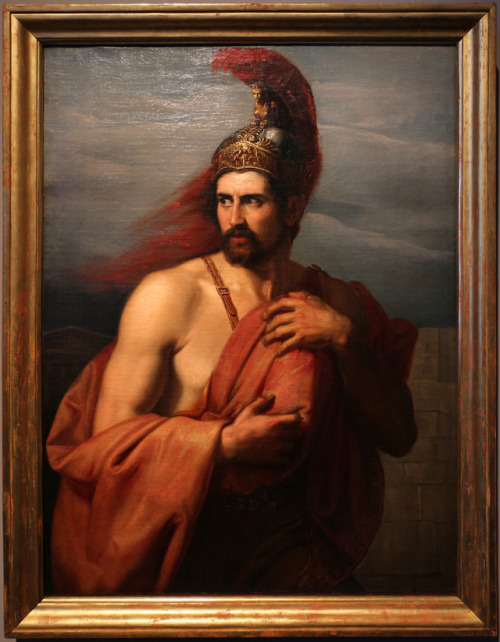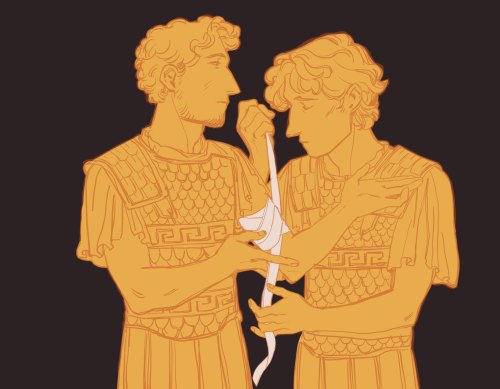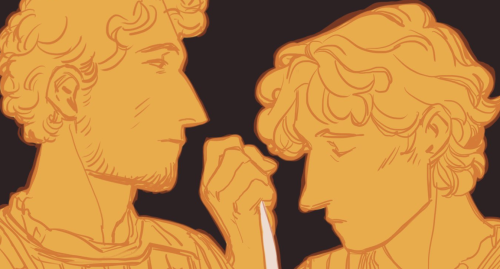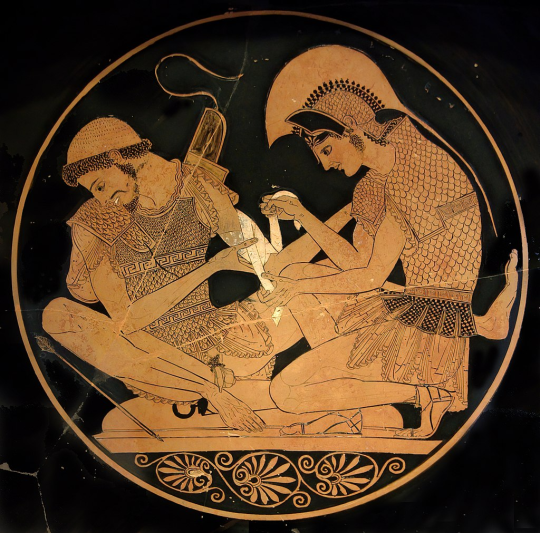#the iliad
This entire chapter is full of the gods’ most pathetic and childish interference. As at so many other points in the epic a god, this time Athena, empowers and emboldens a warrior to slaughter which none can stand against. She picks the famous Diomedes and makes him a bright light of impending death. She tells him to go forth but attack no gods.
Her push and his strength lead to a near death of Idaeus who has to be saved by Hephaestus. Athena immediately goes to Ares and tries to convince him to turn away and leave Diomedes to the attack with her touch still on him. Of course it works because Ares never was the smart one.
After Ares leaves the field Diomedes sets to killing the princes on the Trojan side and while reading it what struck me was what all of these allies say about Troy as a city and a people. The Greeks are there by force of contract, but the allies are there as what feels like real allies. These are peoples with economic and family ties to Troy and it says good things about the Trojans to me. They expanded influence in what feels like a more progressive and positive way. I have no doubt the allies don’t want Troy to fall for their own reasons but still.
During the same rash of violence you see all of the gods lose favorites to the horrors of war. Death after death of ones saved before and beloved by gods on and off the battlefield testifying to the small and lost fact that the gods feel what may be the last of male beauty falter as the city of Troy will to fate. The age of heroes it seems to me fades here and these moments of endless death represent this.
Athena finds a target of menace in Aesepus an ally whose fired shot fails to kill Menelaus due to the quick action of his fellow Argives and the interference again of Athena on the field.
It is this action alone that gives Agamemnon one of his few justifiable moments. The breaking of the truce is a break in sacred war behavior and in doing so he has the right to hate the Trojan action. His belief that they were deceitful I still find irritating since Athena began it, but he is correct in his rage. Of course he can’t help himself from being the jack@$$ he is because most of his rage is the appearance. His concern for his brother’s welfare is all about how it will impact how he looks to his people.
It appears to me that the men of Greece are genuinely worried for the good man Menelaus, but his brother is exactly who Achilles believes him to be. However in righteous anger the Greek army seems to me to be juxtaposed as both movable sheep and unstoppable forces of nature. They move to their goatherd and rush like hurricane. I find the image to be what the word awesome was meant to be. And during this rise of force the shepherds such as Ajax call for men to hold their ground and “No heroics now!” They see the madness and know the end of the game.
In the middle of this Agamemnon takes Odysseus to task and gets Achilles accusations thrown from another mouth of being blustering and mouthy. Interestingly in this moment Agamemnon shows that he has learned and he apologizes. What follows is a frightening image of silent wrath versus Trojan bluster. Clear direction versus opposing voices of allies. The end is the scores of dead on both sides, enough to break your heart.
Excellent, Athena (whom I adore in mythology with the exception of the Iliad) helps end the truce. I can’t stand hypocrisy and the epic roars of divine hypocrisy. So much so that even Zeus has to mock his wife and daughter.
The confrontation between the goddesses of war and hearth and the male Zeus epitomizes some of the key hateful views of women of the time. The way they behave with behind the hand bickering and lack of control show the worst elements of historic ideas of female nastiness. I have to say those things can all be very true. Ask every girl who survived fifth through eighth grade. And as happens often in the Iliad Hera takes it too far with a comment challenging Zeus’s position and is promised vengeance. He acknowledges the fall of Troy, but lets her know that when he wants to destroy the people she loves he will do so with her silence.
I find it interesting that he claims he is ‘giving’ her the victory even though Fate did that. She responds with Iliad’s characteristic bravado and says to raze all her beloved cities, but to allow her work and her status as a God be acknowledged.
The work of the Gods is horrific in their duplicity and damage inflicted as shown when Zeus sends Athena to make sure that the Trojans break the truce first and solidify their downfall but also hurt the integrity that the city had been known for. Yet another thing destroyed in the failure of a single man, Paris, prince of Troy.
The events of the chapter includes an image of Menelaus sending ambassadors to get his wife’s return. These men as well as all the warlords of Greece are known to Helen because they bid for her hand. It is a moment of pure stupidity on the part of Priam and shows a complete lack of awareness. The only thing he gets right is his not blaming Helen for the war but the gods. Their interference is to blame. This whole thing would have ended without Aphrodite’s actions in the beginning and at the fight with Paris and Menelaus. Reminds me yet again why I’ve never been a fan of hers.
So many opportunities to stop the death, but fate demands that it continue. Menelaus should have been given Helen. He wasn’t.
I find it sad that when Helen looks at the warriors of Greece she doesn’t know that the reason she doesn’t see her brothers is that they have died.
Following the gathering the image is of silent Greeks marching towards shouting Trojans. The image is of glorious wars, but is interrupted by the boasting act of Paris. His paper tiger facade fails a soon as he sees Menelaus.
The disappointment and disgust of Hector is palpable. What is interesting to me though is Paris’s response to his brother’s condemnation. His statement is essentially, I am what I am because the gods made me this way. It is not my fault and I understand that you must hate me for it. Later he admits the same to Helen of his nature. His self-awareness is fascinating to me.
Especially given the response of Menelaus who is a good person. He has been ‘injured’ and will move for peace.
Juxtapose the men with Helen’s self-awareness now that this death and chaos is her fault. I think she was horrified by the old men’s talk of glorifying of a war over her and the beauty of the war. She believes that she would be better off dead. It is obvious that she wants to return to Greece or die but the interference of Aphrodite after Paris is injured shows the survival instinct in a human when threatened.
After reviewing the actions of the Greeks Homer moves to the goddess Iris rushing to the Trojans and moving them to war. The allies ready for war and you get a full description of the allies of which Aeneas is the first, followed
Odds and ends: there is specific description of Troy. Aeneas is not Trojan, but Dardanian (an ally) and is a prince of that city.
This chapter starts with an intentional lie on the part of Zeus to Agamemnon. The dream sent plays on the king’s existing weaknesses including his pride. To me this is in two ways; that he is destined to win and that Zeus would speak especially to him. It takes a level of arrogance that only Agamemnon has shown up until now to believe these things.
He uses this sense of self-importance and an attempt at reverse psychology to push the Greeks to attack when they do. However Odysseus sees the psychology and a Greek named Thersites sees the arrogance. Thersites calls out the king and demands that they should go home. His message is the Greek version of Cassandra inside the city and he is abused and ignored.
Agamemnon’s push for continuing the war includes “payment in full” for the miseries born by the Greeks during the war in rape. He threatens to kill deserters and says that if they lose it is their own cowardice. He then acknowledges his fault in the fight with Achilles but doesn’t take responsibility. Instead he makes a bid to tell the men that if Achilles fought the war would be over.
Odds and ends: Odysseus is called raider of cities, the ox sacrificed has to be five years old and I’m not sure why, the sacrifice will work but not right away, Ares sons are Greek but he fights for the Trojans.
There are two distinct Ajax and I wonder if these are likely part of the original oral tradition.
Hercules’ sons and grandsons are at Troy which helps line up the timing of the different myths.
The interplay between Hera and Zeus is one of my favorite things. She is dealing with so much jealousy and his response is one of shut up. I’ll tell you when I’ve decided what will happen. “Only estrange yourself from me a little more– and all the worse for you.” He threatens to beat her if she keeps it up.
I find the whole thing funny, not in a modern way, but I do. I always have. In Greek culture I know that Hera was an important but in this presentation she is treated as the model of a hysterical woman. She is juxtaposed with Athena, who while not ‘nice,’ is smart and thoughtful and effective. Yet another reason why even though I dislike Athena’s choices in the Iliad, I still like her and like Hera less.
“Rage–Goddess, sing the rage of Peleus’ son Achilles murderous, doomed, that cost the Achaeans Countless losses hurling down to the House of Death so many sturdy souls, great fighters’ souls, but made their bodies carrion, feasts for the dogs and birds.
The opening line- introduces the situation the Greeks find themselves in for their lack of religious respect. Agamemnon is responsible and when it is brought to his feet, he blames others and makes the self-serving offer to give up Chryseis but punish Achilles. His attitude and the person he attacks leads to the foundation of the story.
Achilles disgust with his "commander” is well founded. He offered to get Agamemnon the city essentially and was figuratively slapped in the face. His comments follow that the home turf greek raids have done him more damage then the Trojans. His efforts have been honorable and Agamemnon is a “grasping” POS really.
The following confrontation is full of pride and rage on both parts, but I will say that as much as I like Hector over Achilles, I feel twice that of Achilles over Agamemnon. I find it sad though that Athena stops Achilles from killing Agamemnon then and there. I do appreciate that like Hector- Achilles honors the gods enough to stop when Athena directs. His parting shot instead of a spear, is to call him a coward (biggest insult).
This sense of self-control is evident later at the tents when you see his rage isn’t blind. He vents his rage at Agamemnon, and to some extent I believe the other warlords, rather than the average soldier. He blames the leadership, not the average soldier who he knows is fighting and dying.
What follows with his plea to his mother and his refusal to fight will hurt the average soldier but it is not aimed at them. And I find it interesting that Zeus doesn’t love Achilles per se, but loves his mother. And the pleas lead to a trade of Apollo’s rage at the Greeks to the punishment of Zeus. Not a great trade all in all.
On a funny note I find it funny that the whole war is started by women (Paris apple), over women (Helen), worsened (Chryses), promoted (Thetis), and fought (Athena and Hera) by women. Women’s jealousy over the apple and the continuation of it (Hera thinks Zeus is sleeping with Thetis). Women at the center of misery and power.
Not surprisingly many heroes in Greek literature are demi-gods and in the Iliad there is no end of them. So many of them take on an aspect of their parents persona. What is unique is the two pivotal demi-gods are at cross-points in their self analysis.
The editor of this edition (Robert Fagles) points out that by the time the war starts Helen is done being a narcissist while Achilles is beginning his full swing. It is an interesting point. However if still don’t see how an aware Helen doesn’t stop the war by stepping back to her husband. I still can’t like her.
However the editor points out something else I never really looked at before which is that while Achilles is raging in his wounded pride, he never loses sight of who to blame. He doesn’t kill the messenger. He knows that it Agamemnon who has no honor. The editor indicates that Achilles honor is always his motivation but for me personally I see a great deal more pride then honor. He believes himself better by his grandeur in battle but never acknowledges that his prowess is a cheat. First in his birth to a nymph, second his protection from Styx, and finally third from the god-made armor brought to him.
Honor should not let a real warrior cry to his mother to punish the people were mean to him. He shouldn’t watch men die for his “injury” and he shouldn’t punish another for his own guilt as he did Hector. I acknowledge Fagles’ expertise but I’m not convinced of the honor element. What I do agree with is that the story arch brought about by Priam’s night visit does return Achilles to hero status to me.
In that moment he remembers honor, what civilized and a truly great man looks like. It his redeeming act and it is too late to undo his desecration. I still struggle with the importance of sons/children for men in that society and Achilles had none. I’m working on that in my head.
The Greek gods are personalities that many of us are raised with in myth but is seems that they are far closer in their relation to humans than the Sumerians or the Hindus. They are human in personality and form. Their concerns seem to mirror very human concerns. Whereas entities like Krishna have existential existence the personality of Zeus for example is very concrete. He comes into being new unlike the other gods before.
They are also bound to outside fate in a way other gods aren’t. They can act in their own interest as Hera and Athena do so many times but as shown for both of them and Zeus, they cannot change the fate of their favorites. They can influence the behaviors acting as a devil/angel on the should as Athena does for Achilles many times to extend his life but she cannot save him anymore then Zeus can save his son or Troy.
The difference may be subtle but I think it is important to understanding the epic and I want to keep it in mind while reading the text to study the changes in cultural understanding. The Iliad is to the Greeks as the Mahabharata is the Hindu showing earlier culture concepts of Gods in battle. I will have to see if I can find a parallel to the Bhagavad Gita for the Greeks showing sophistication of the religious concept. (If anyone knows it please respond.)
Mortal Pains - sparklight - Ancient Greek Religion & Lore [Archive of Our Own]
Summary: Aphrodite gives birth to a mortal son, and mortals are ever so fragile.
Infants even more so, but there is nothing like war and the threat of injury that comes with it to remind those immortal and untouched by death how little difference there is, in the end, between an infant and a full-grown man.
*
(The full fic for the snippet I posted earlier!)
erisis the greek goddess of strife and discord; is best known for her part in starting the trojan war. when she alone of the gods was not invited to the marriage of -eleus and thetis, she threw among the guests a golden apple inscribed “for the most beautiful.”
Post link
“The sons of the Achaeans shouted applause at the words of Diomedes, and presently Nestor rose to speak. ‘Son of Tydeus,’ said he, ‘in war your prowess is beyond question, and in council you excel all who are of your own years; no one of the Achaeans can make light of what you say nor gainsay it, but you have not yet come to the end of the whole matter. You are still young- you might be the youngest of my own children—still you have spoken wisely and have counselled the chief of the Achaeans not without discretion;’”
Homer, The Iliad.
Diomedes, a hero worshipped like god.
Painting: Diomede fugge nasconendo il palladio (Diomedes escapes hiding the palladium) by Vincenzo Giacomelli, 1839. Galleria dell’Accademia, Venice.
Post link
Now when Dawn in robe of saffron was hastening from the streams of Oceanus, to bring light to mortals and immortals, Thetis reached the ships with the armor that the god had given her.
The Iliad.
Morning Star by Alphonse Mucha, 1902.
Post link

The Reconciliation of Helen and Paris after His Defeat by Menelaus, Richard Westall, 1805
He feared suddenly for red-haired Menelaus
but Diomedes strong with the war cry answered,
‘Is that an order? Pick my own comrade?
Then how could I pass up royal Odysseus here?
His heart’s so game, his fighting edge so keen,
the best of us all in every combat mission
Athena loves the man. With him at my side
we’d go through fire and make it back alive
no one excels the mastermind of battle.’-the iliad, book x
odysseus and diomedes
I was drawing a comic of the night raid scene and realized half way through the layouts that I forgot to figure out designs for them first lmao. so! designs!!! and now to draw the night raid–
Post link
anyways, one time I got bored and I rated Greco-Roman mythology-based names depending on what happened to the character. sometimes I cringe at people’s names, so here’s a guide on what not to name your kid!
Penelope:really pretty name imo. based on Odysseus’ wife and hey, she had a happy ending! granted it took about 20 years, but not too bad 7.5/10
Hermione: cute name but everyone’s gonna think you’re a Harry Potter nerd. but if you want to correct them, tell them that Hermione was the daughter of Helen and Menelaus and that’s all you know bc she was barely referenced in the Odyssey. not too bad but kinda irrelevant and also your kid will be made fun of regardless 7/10
Victoria: what a great name, it’s classic and classical and sounds very regal. comes from the Roman goddess of victory, so that’s cool and sounds a lot nicer than Nike. your daughter is bound to win everything and be victorious (pun intended) 9/10
Simon: again, a nice, classic name. apparently Simon was one of the Telchines, or the original inhabitants of Rhodes, and son of indeterminate titans. in some stories he had flippers for hands and a dog head, so that’s kinda awkward 8/10
Gaia: kind of a bitchy name if you consider how Gaia told her son to chop her husband into pieces. not the best wife by any standards. some of you may consider that a #girlboss moment though and she wasn’t entirely bad so 5.5/10
Pandora: everytime I see that someone’s named Pandora I cringe. listen, I get it’s a pretty sounding name but are people even familiar with this story? the dumbass unleashed all of the bad things into the world; she’s the reason why you stubbed your toe and why coronavirus happened! too much bad energy for me 4/10
Hector: listen, I don’t care how old the Iliad is, I’m still upset about Hector. mans deserved better than to die at the hands of an angry gay and his backstabbing goddess. if I hear that your kid is named Hector I’m gonna take it personally and be sad about it 3.5/10
Adonis: bro his grandfather was also his father and he popped out of a tree. then he was groomed by Aphrodite and killed by Ares bc the bitch was jealous. man could not catch a break. please do not name your kid after an unfortunate product of incest and divine punishment 2/10
Jocasta:don’t
















